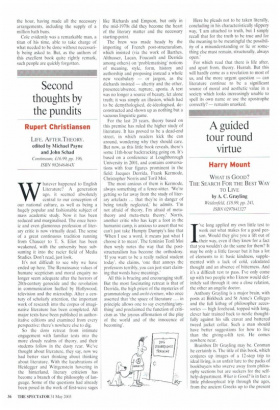Second thoughts by the pundits
Rupert Christiansen
LIFE. AFTER.THEORY. edited by Michael Payne and John Schad Continuum, £16.99, pp. 196, ISBN 982646464X
Wliatever happened to English Literature? A generation ago, it seemed absolutely central to our conception of our national culture, as well as being a hugely popular and fashionable subject of mass academic study. Now it has been reduced and marginalised. The once heroic and even glamorous profession of literary critic is now virtually dead. The sense of a great continuous tradition running from Chaucer to T. S. Eliot has been weakened, with the university busy subsuming it into the racier field of Media Studies. Don't read, just look.
It's not difficult to see why we have ended up here. The Renaissance values of humane scepticism and moral enquiry no longer seem adequate after the horrors of 20th-century genocide and the revolution in communication fuelled by Hollywood, television and the microchip. After a century of scholarly attention, the important work of research into the corpus of imaginative literature has been completed. All major texts have been published in authoritative editions and examined from every perspective: there's nowhere else to dig.
So the dons retreat from intimate engagement with familiar texts into the more cloudy realms of theory, and their students follow in the dusty rear. We've thought about literature, they say, now we had better start thinking about thinking about literature. With the lucubrations of Heidegger and Wittgenstein hovering in the hinterland, literary criticism has become a branch of the philosophy of language. Some of the questions had already been posed in the work of first-wave sages like Richards and Empson, but only in the mid-1970s did they become the heart of the literary matter and the necessary starting-point.
The brew was made heady by the importing of French post-structuralism, which insisted (via the work of Barthes, Althusser, Lacan. Foucault and Derrida among others) on `problematising" notions of meaning, style, form, history and authorship and proposing instead a whole new vocabulary — or jargon, as the diehards insisted — alterity and the other, presence/absence, rupture. aporia. A text was no longer a source of beauty, let alone truth; it was simply an illusion, which had to be demythologised, de-ideologised, deconstructed and shown up as nothing but a vacuous linguistic game.
For the last 20 years, theory based on this premise has ruled the higher study of literature. It has proved to be a dead-end street, in which readers kick the can around, wondering why they should care. But now, as this little book reveals, there's some 11th-hour backtracking going on. It's based on a conference at Loughborough University in 2001, and contains conversations with four figures prominent in the field: Jacques Derrida, Frank Kermode, Christopher Norris and Toni Moi.
The most anxious of them is Kermode, always something of a fence-sitter. 'We're getting so far away from the study of literary artefacts ... that they're in danger of being totally neglected,' he admits. 'I'm not afraid of theory, I'm afraid of metatheory and meta-meta theory.' Norris, another critic who has kept a foot in the humanist camp, is anxious to assert that we can't just take Humpty Dumpty's line that 'When I use a word, it means just what I choose it to mean'. The feminist Torii Moi then wryly notes the way that the poststructuralism has become the orthodoxy. 'If you want to be a really radical student today', she claims, 'one that annoys the professors terribly, you can just start claiming that words have meanings.'
All this is bracing and encouraging stuff. But the most fascinating retreat is that of Derrida, the high priest of the mysteries of grammatology and archi-dcriture, who once asserted that 'the space of literature in principle allows one to say everything/anything' and proclaimed the function of criticism as 'the joyous affirmation of the play of the world and of the innocence of becoming'. Here he pleads not to be taken literally, concluding in his characteristically slippery way, 'I am attached to truth, but I simply recall that for the truth to be true and for the meaning to be meaningful the possibility of a misunderstanding or lie or something else must remain, structurally, always open.'
For which read that there is life after, and apart from, theory. Hurrah. But this will hardly come as a revelation to most of us, and the more urgent question — can literature continue to be a significant source of moral and aesthetic value in a society which looks increasingly unable to spell its own name or use the apostrophe correctly? — remains unasked.


































































 Previous page
Previous page